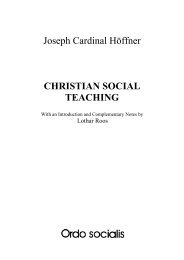Prof. Franz Josef Stegmann Bethlehem Social ... - Ordo Socialis
Prof. Franz Josef Stegmann Bethlehem Social ... - Ordo Socialis
Prof. Franz Josef Stegmann Bethlehem Social ... - Ordo Socialis
You also want an ePaper? Increase the reach of your titles
YUMPU automatically turns print PDFs into web optimized ePapers that Google loves.
<strong>Stegmann</strong><br />
tition was elaborated by the School of Freiburg, which was well-known in economics and<br />
headed by the famous economist Walter Eucken. 48<br />
2.2 Main neoliberal reform approaches<br />
The reform approaches of European neoliberalism compared with earlier capitalism may be<br />
summarised - as far as I can see - in four theses:<br />
• Freedom to contract and free competition are not identical: The older or palaeoliberal<br />
capitalism demanded both absolute freedom of the economic participants as well as free<br />
and well-working competition. Its advocates did not realise, however, that the absolute<br />
freedom in the marketplace, the absolute freedom to make contracts, allows and entitles<br />
the establishment of monopolies and cartels. Absolute freedom of the individual economic<br />
participants could and can itself destroy free competition. History teaches that this has<br />
repeatedly happened in the past and continues to happen today. (For example, there is no<br />
competition if all petrol stations in a region are owned and run by one company.) Rid of<br />
competition, the monopolist is tempted to increase prices to the consumers' disadvantage,<br />
thereby gaining a monopoly profit. This misuse of the legitimate principle of profitability<br />
can be prevented if each economic participant permanently competes with fellow<br />
competitors in the marketplace. Competition forces the single enterprise to set its prices as<br />
low as possible in order not to be eliminated by fellow competitors, by the market. Only in<br />
the case of real and complete competition does the pursuit of self-interest contribute to the<br />
best possible provision for all people and serves the public weal: (a part of) what Christian<br />
<strong>Social</strong> Teaching calls the "common good".<br />
• Competition based on performance and achievements does not arise by itself; it has to be<br />
"established" by the state: In the neoliberal concept, the state is not simply a "night<br />
watchman". Since real competition does not automatically result from the free play of<br />
forces, as history and modern economics teach, politics has the responsibility to establish<br />
and promote "competition of achievements' and to prevent - demands the Encyclical<br />
Quadragesimo Anno, published in 1931 - "despotic economic domination ... in the hands<br />
of a few"; 49 ie, it must prevent monopolies and cartels. Monopolies that are unavoidable<br />
must be controlled by the state. Its policy has to provide a "legal framework" for the<br />
economy; a constitution that safeguards competition and - if necessary - "establishes"<br />
competition. The German expression is veranstalten. This term means that whenever and<br />
wherever there is no competition, state policy has to make the market participants<br />
compete, possibly forcing them to compete. According to neoliberal thinking, this free<br />
"competition of achievements", established and guaranteed by the regulating policy of the<br />
state, is the so-called "third way" between liberal capitalism and communist collectivism.<br />
For the founders of <strong>Social</strong> Market Economy, therefore, a monopolies law and a<br />
monopolies commission that examines take-overs and ensures that a monopoly is not<br />
being created, are the core, the "basic law of the <strong>Social</strong> Market Economy". 50 (In Germany.<br />
the law and the commission had to be introduced by Ludwig Erhard, the abovementioned<br />
Minister of Economic Affairs, and his fellow supporters of <strong>Social</strong> Market Economy<br />
against heavy opposition from industry and commerce. The national parliament passed the<br />
law in 1957.)<br />
48 See Walter Eucken, Die Wettbewerbsordnung und ihre Verwirklichung, in: <strong>Ordo</strong> 2 (1949) 1‐99: id.,<br />
Nationalökonomie ‐Wozu? Düsseldorf 4 1961; id., Die Grundlagen der Nationalökonomie, Berlin 1965; id.,<br />
Grundsätze der Wirtschaftspolitik. Ed. by Edith Eucken and K. Paul Hensel, Tübingen 5 1975.<br />
49 Pius Xl. After Forty Years ‐ Ouadragesimo Anno (1931), No' 105'<br />
50 Hans Herbert Götz, Wettbewerb und Monopolkampf. Erinnerung an <strong>Franz</strong> Böhm, in: Frankfurter Allgemeine‐<br />
Zeitung, No. 102 / 3 May 1995, 10.<br />
24















